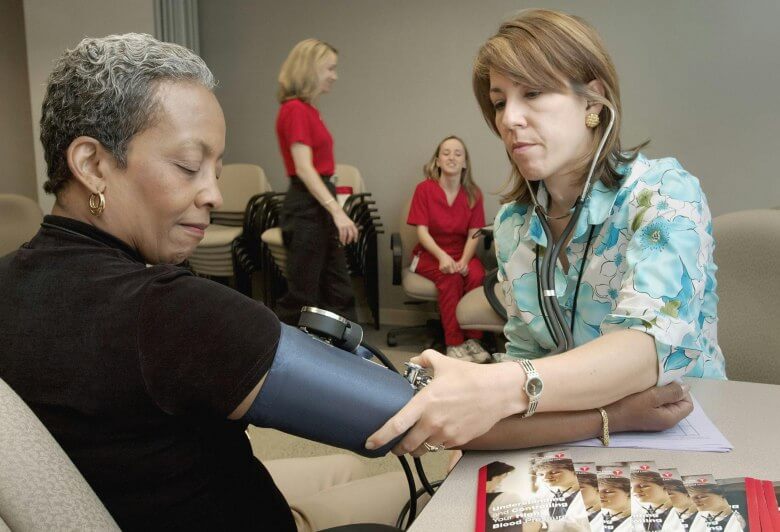Highlights:
- Valsartan, also known as Diovan, lowers blood pressure and can help prevent a heart attack.
- This drug is an angiotensin II receptor blocker, which works by relaxing the blood vessels.
- Valsartan is usually well-tolerated, but may have an impact on kidney function, so talk to your doctor before starting this medication.
- You can find the best price for valsartan with BidRx.
If you’re one of the nearly 120 million Americans with high blood pressure, your doctor may have prescribed medication to help protect your heart. Valsartan is one of many effective drugs to help control blood pressure by relaxing blood vessels and putting less strain on your heart.
What Is Valsartan and What Is It Used For?
Valsartan is a medication primarily used to treat high blood pressure (hypertension), but it may also be used to help treat heart failure and lower the risk of a heart attack or stroke. Drugs like valsartan are often prescribed to help people with kidney disease control their blood pressure.
This drug is FDA approved and is often sold under the brand name Diovan. Valsartan is a go-to medication for doctors aiming to reduce complications related to heart conditions.
How Does Valsartan Work?
Valsartan belongs to a class of drugs called angiotensin II receptor blockers (ARBs). This drug works by blocking the action of angiotensin II, a natural chemical that narrows veins and arteries to help support normal blood pressure. For people with chronically high blood pressure, ARBs block the action of this chemical, helping relax and widen blood vessels. This lowers blood pressure, improves blood flow, and makes it easier for the heart to pump blood.

What Formulas Are Available for Valsartan?
Valsartan is available mainly in tablet form, with strengths ranging from 40 to 320 milligrams to accommodate different treatment needs. In some cases, very low doses of valsartan may be safe for children under age 5. Valsartan can be taken alone, or it may be used in combination drugs:
- Sacubitril and valsartan. Adding an angiotensin receptor neprilysin inhibitor (ARNI) like sacubitril further supports heart health by blocking certain enzyme changes that may raise blood pressure. This drug is often sold under the name brand Entresto.
- Amlodipine and valsartan. This combination uses a calcium channel blocker (amlodipine) with valsartan to improve blood pressure and relax blood vessels. This drug is often sold under the name brand Exforge.
- Amlodipine, valsartan, and hydrochlorothiazide. Adding a diuretic (hydrochlorothiazide) to the powerful amlodipine-valsartan combination reduces swelling and water retention in addition to controlling blood pressure. This drug is often sold under the name brand Exforge HCT.
Valsartan Dosage and Administration
Valsartan is available in a wide range of dosage strengths, and your prescription will vary depending on your needs and other health conditions. Most people take valsartan once per day, but your doctor may suggest taking it twice per day or in combination with other drugs. Note that these dosage regimens are general guidelines; only a healthcare provider can determine the appropriate dosage for an individual.
How Should I Take Valsartan?
Take valsartan exactly as your doctor prescribes, with or without food. Try to take it at the same time each day to maintain stable blood levels. Drink plenty of fluids while taking this medication unless your doctor tells you otherwise. Don’t suddenly stop taking valsartan because it can cause an unsafe spike in blood pressure.
![]()
What Are the Potential Side Effects of Valsartan?
Like all medications, valsartan may have side effects. Not everyone experiences the same symptoms, and this list is not complete. Talk to your doctor about valsartan and all symptoms you experience so you can balance this medicine’s benefits and side effects.
Common Side Effects of Valsartan
- Dizziness
- Headache
- Fatigue
- Nausea
- Diarrhea
- Cold or flu-like symptoms
- Muscle pain or stiffness
Less Common But More Severe Side Effects of Valsartan
- Kidney problems
- Liver problems
- High potassium levels (hyperkalemia)
- Low blood pressure (hypotension)
- Swelling (angioedema)
- Allergic reaction
What Should I Avoid When Taking Valsartan?
There are some precautions you should take while using this medication:
- Avoid potassium supplements or salt substitutes containing potassium. If you eat a lot of high-potassium foods like bananas or oranges, speak to your doctor about valsartan’s effects.
- Avoid or limit alcohol; it can lower your blood pressure too much while taking valsartan.
- Be careful when driving or operating heavy machinery until you know how valsartan affects you.
What Should I Do If I Miss a Dose of Valsartan?
If you miss a dose, take it as soon as you remember. If it’s almost time for your next dose, skip the missed one and continue your regular schedule. Don’t take an extra dose to make up for a missed one.

What Precautions Should I Take With Valsartan?
Before taking this medication, ask your doctor about valsartan’s effects and follow these special precautions:
- Allergic reactions. Tell your doctor and pharmacist about any allergies you have to valsartan, other medications, or valsartan’s ingredients.
- Medication check. Valsartan is a powerful drug that may have interactions. Talk to your doctor about all prescription and nonprescription medications, vitamins, nutritional supplements, and herbal products you currently use or plan to use. Be sure to mention any ACE inhibitors, NSAIDs, COX-2 inhibitors (like Celebrex), aspirin, aliskiren, diuretics, and potassium supplements.
- Health history review. Inform your doctor about any past or present health issues, especially those related to bile duct blockages, heart, kidney, or liver diseases.
- Pregnancy. Pregnant people should not take valsartan. It is classified as a pregnancy category D drug by the FDA, meaning there is positive evidence that it’s harmful to unborn babies.
- Breastfeeding. Valsartan has not been studied during breastfeeding, so the possible risks for nursing infants is unknown. The decision to use valsartan while breastfeeding should involve a careful risk-benefit analysis with a healthcare provider.
- Risk of dizziness. Be aware that valsartan can cause dizziness, lightheadedness, and fainting, especially upon standing up quickly from a lying position. Take precautions by getting up slowly, especially until you know how this medication affects you.
- Dehydration and blood pressure. Understand that conditions like diarrhea, vomiting, insufficient fluid intake, and excessive sweating can lower blood pressure significantly, leading to potential lightheadedness or fainting. Maintaining healthy hydration while taking valsartan is essential.
Contraindications of Valsartan
Some people should not take valsartan. Others should use it with caution under close medical supervision.
Keep in mind that these lists are general guidelines. In special cases, doctors may feel the benefits of taking a particular medication outweigh the risks, so if you are in one of these groups, talk to your doctor about your personal situation.
Who Should Not Take Valsartan?
- Pregnant women, because this drug can harm an unborn baby
- People with a history of angioedema (swelling under the skin)
- People on dialysis or with severe kidney disease
- People with severe liver disease
- Diabetics who are taking aliskiren, because this can increase kidney damage
Who Should Take Valsartan With Caution?
- People with mild to moderate liver disease
- People with mild to moderate kidney disease
- Patients with congestive heart failure
- Elderly patients, because they may be more sensitive to the changes in blood pressure regulation
- People taking diuretics or water pills that lower blood pressure
- People who are prone to dehydration or electrolyte imbalances, including athletes who lose excessive fluid through sweating
- People with high potassium levels (hyperkalemia), because valsartan can further raise potassium levels
Are There Any Other Potential Drug Interactions With Valsartan?
According to Drugs.com, a significant number of drugs and supplements can interact with this medication.
The most important potential drug interactions to be aware of include:
- Direct renin inhibitors. Taking direct renin inhibitors with valsartan can lead to an excessive drop in blood pressure and worsen kidney function.
- ACE inhibitors. ACE inhibitors combined with valsartan can increase the risk of low blood pressure (hypotension), kidney damage, and high potassium levels (hyperkalemia).
- Drugs and supplements that raise potassium levels. When taken with valsartan, these medications and supplements can elevate potassium levels in the blood, potentially leading to dangerous heart rhythms.
- Medications for kidney disease. These drugs may interact with valsartan, potentially worsening kidney function or making kidney disease medications less effective.
- Lithium. Valsartan may make it more difficult to clear excess lithium from the blood, potentially leading to lithium toxicity.
- Muscle relaxers. When taken with valsartan, muscle relaxers may lower blood pressure too much.
- Certain antibiotics. Some antibiotics, like trimethoprim, can increase the risk of hyperkalemia and worsen kidney function when taken with valsartan.
For the complete known interactions list, visit the Drugs.com Drug Interactions Checker. However, no list of potential drug interactions is complete, so it’s important that you speak to your healthcare providers about possible interactions and to let them know if you experience any new or unusual symptoms after taking this medication.

Treat Your Heart Right — For Life
Uncontrolled high blood pressure can set off a cascade of other health problems, ranging from strokes to vision problems to lifelong kidney disease. Managing your blood pressure is the first step in protecting your heart so you can live a long and healthy life. Valsartan isn’t for everyone, but for many people with high blood pressure, this drug can help keep your heart strong.
Get the Lowest Price for Valsartan With BidRx
If your doctor has prescribed an ARB medication like valsartan, you can get the best price with BidRx. Sign up and create a bid for your prescription, then let pharmacies compete to offer you the best price for your budget. Depending on the offer you choose, you can pick up your medications locally or have them shipped right to your door. Sign up for your free account and get started today!
This information is intended for general informational purposes only. It is not a substitute for professional medical advice, diagnosis, or treatment. Always seek the advice of your physician or other qualified health provider with any questions you may have regarding a medical condition or medication.
